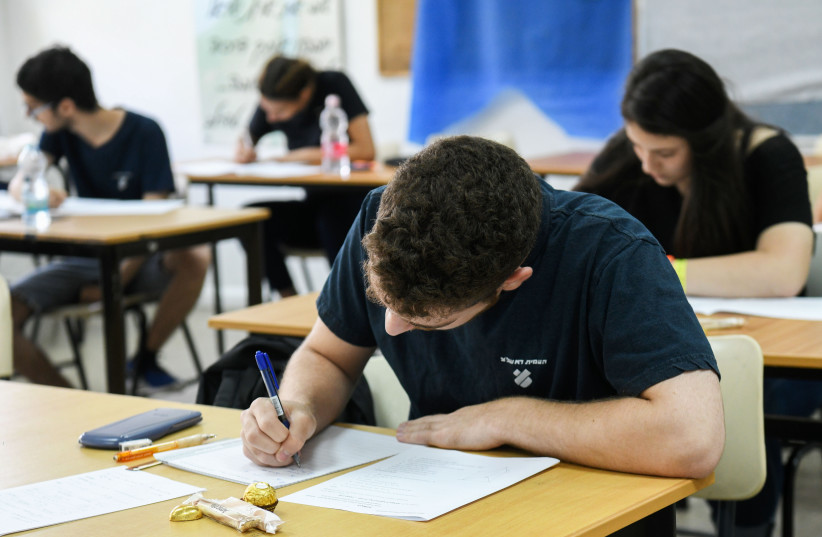The sun has barely crept over the horizon when Rona, 17, takes a seat in her first class of the day: financial literacy. She usually peppers her teacher with questions about budgeting and investing. After all, with graduation just around the corner, she has to learn all she can to succeed in the real, ever-changing world.
The next four hours are dedicated to general academic courses, with a 30-minute break for lunch. Then, Rona is off to work on her artificial intelligence certification from Microsoft. She already has two certifications under her belt, including a digital marketing certificate from Google and a bot programming certificate from IBM. Completing another certificate will bring her one step closer to a career in the hi-tech field.
That is a typical Sunday for this typical high school student.
The start-up education in the start-up nation
Surprised? Rona is one of more than 100,000 students receiving a “start-up education” from Israel Sci-Tech Schools, the largest independent charter school network in Israel. Here, entrepreneurship is the foundation of the scholastic diet.
Israel Sci-Tech Schools know entrepreneurship is a critical life skill, not just a business term in the start-up nation. That’s why, every year, Friends of Israel Sci-Tech Schools raises significant funds for this $600 million enterprise to reshape the educational experience of Israeli students.

Unlike some schools, where memorization overshadows comprehension, our educational approach is rooted in critical thinking and applied learning. We spark young minds in school so they learn to contribute to society. Our students become hi-tech leaders who shape economic growth in Israel and beyond.
We are doing our part to catapult Israeli innovation and entrepreneurship, ensuring that every student can become a deep thinker and team player.
Every day, our school grounds function as training grounds. The blueprint is our four-pronged, future-focused pedagogy: meet learners where they are; empower students to take ownership of their education; create space for constructive feedback and candid reflection; use tech tools to elevate learning.
This approach informs our flagship program: iSTEAM (Innovation, Science, Technology, Engineering, Arts and Mathematics). Through project-based learning, students build multidisciplinary skills and global competencies at more than 250 schools and technological colleges across Israel.
They are going beyond textbooks and tests to learn a subset of 21st-century skills: inquiry, research, problem-solving, independence, digital literacy, leadership, communication, social responsibility, coping with failure, and much more.
These skills are learned inside and outside of the four walls of a classroom. Every day, we provide opportunities for our students to leave their desks and engage in raw learning. Some are conducting experiments with wooden hive boxes to address the dwindling population of honeybees. Others are using their delegation skills to rehabilitate nearby green spaces alongside their peers.
There is even a growing number of students on a quest to create and pitch their own business products. A group of seventh graders recently used food technology to make a nutritional doughnut without losing flavor.
Another group of students tinkered in the research laboratories of Safed College, transforming coffee waste into dandruff shampoo and nutrient-rich snacks for people who are on the go. Each group was able to consult with accomplished entrepreneurs and utilize hi-tech workspaces, equipped with 3-D printers, media and film studios, robotics labs and power tools.
Diverse students and diverse opportunities
OUR EVERYDAY opportunities are just as diverse as our students, who represent every pocket of Israeli society. They are Jewish, Muslim, Christian, Israeli Arab, Bedouin and Druze. And most of our students have the odds stacked against them.
They come from families who have lived on the social, economic and geographic periphery for generations, severely limiting their access to opportunities in prosperous cities and communities. Each of them must work harder to chip away at – and eventually shatter – their own glass ceiling.
At Israel Sci-Tech Schools, we give them the tools to do just that. With state-of-the-art technology, innovation centers and makerspaces, we are educating Israel’s future workforce, preparing every student for a career, as well as social and economic mobility. We give students the tools to create their future, and in turn, help Israel continue to grow.
Look at Aviel, who grew up in a religious community in Jerusalem. As a teenager, he began skipping classes, opting to wander the streets rather than attend yeshiva. His family, wearied by their attempts to guide him, sent him to Zoharim Sci-Tech, one of our schools.
There, he connected with our educational approach, which offered a much-needed break from straight-row chairs and top-down lectures. There was space for his mind to stretch and soar in computer labs and workshops, teaching him to think critically. Now, 18-year-old Aviel is looking forward to a career as a computer technician after he completes his army service.
That is the goal. We are preparing students for what comes next: the army and the workforce. Supporting their educational journey starts with an investment in the very thing that makes Israel such a powerhouse: entrepreneurship. The ability to think outside of the box and innovate. The ability to recover from failure and try again.
Restructuring our educational playbook, all the while thinking of the careers of the next half century, has been and will continue to fuel success in the ever-expanding era of iSTEAM. As we watch students like Aviel and Rona, we know we are on the right track.
They – and so many others who are nearing graduation – are ready to become the next generation of scientific and technological changemakers, who will strengthen Israel and the entire world.
Jonathan Boiskin is executive director and Zvi Peleg is director-general of Friends of Israel Sci-Tech Schools, an independent school network in Israel.
